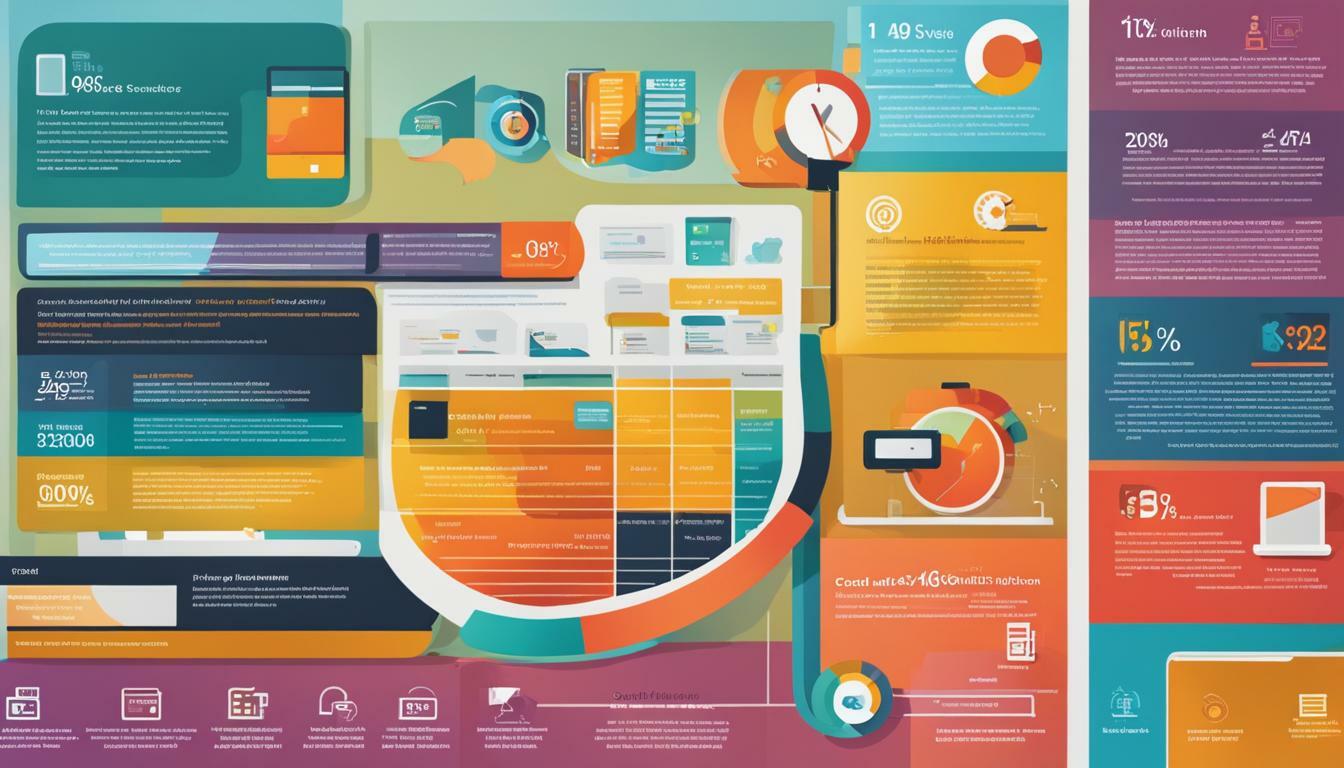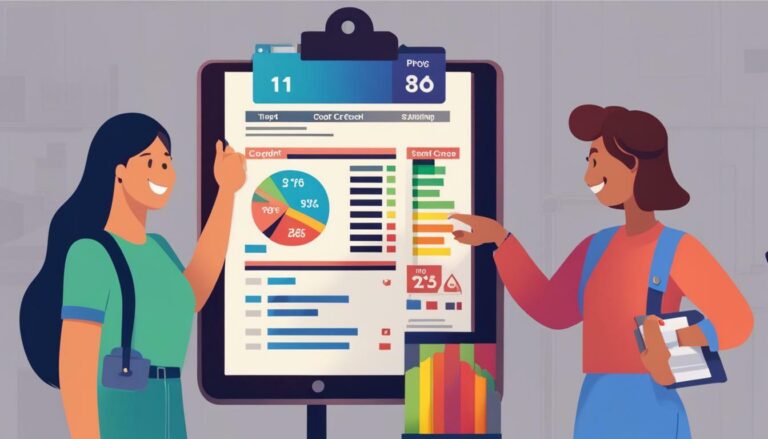Understanding Credit Reporting in the Digital Age

In the digital age, navigating the complexities of credit reporting is crucial to ensure financial well-being and protect your personal data. With the explosion of personal data and its use for decision-making and marketing, understanding credit reports and scores is more important than ever. Credit bureaus play a significant role in providing objective and comprehensive views of consumers’ credit history, enabling lenders and financial institutions to assess creditworthiness. Additionally, online credit monitoring has become essential for effective financial data protection. It’s time to dive into the world of credit reporting in the digital age and equip yourself with the knowledge to make informed financial decisions.
Key Takeaways:
- Understanding credit reporting is crucial in the digital age to protect your personal data and ensure financial well-being.
- Credit bureaus provide comprehensive credit reports and scores that help lenders and financial institutions assess creditworthiness.
- Online credit monitoring is essential for effective financial data protection.
- Policy makers can encourage the reporting of alternative data to increase access to credit for underrepresented groups.
- Developing regulatory guidance is necessary to balance innovation in using non-financial personal data for credit decisions while protecting consumers’ rights.
The Role of Credit Bureaus in the Digital Age
Credit bureaus serve as crucial repositories of credit information, providing lenders and institutions with a comprehensive view of consumers’ credit history. These bureaus collect and aggregate data from various sources, including lenders, creditors, and public records, to generate credit reports. These reports contain valuable information such as credit accounts, payment history, and public records, allowing lenders to make informed decisions about extending credit.
One of the main functions of credit bureaus is to ensure the accuracy and reliability of credit information. They employ strict data verification processes to ensure that the information they provide is up-to-date and accurate. By maintaining standardized reporting practices, credit bureaus enable lenders to compare creditworthiness across consumers, facilitating fair lending practices.
🚨 TUIC Errors + Low Credit Score?
CreditScoreIQ helps you build credit faster by reporting utility bills to all 3 bureaus—while you dispute errors.
Start Building Credit Today →Credit bureaus also play a vital role in enabling consumers to access their credit information. Many credit bureaus have developed user-friendly websites that allow individuals to access their credit reports. These websites provide valuable tools and resources to help consumers understand their credit scores and take steps to improve them. They also offer credit monitoring services, which can help individuals detect any fraudulent activity and protect their financial data.
Table:
| Credit Bureau | Website |
|---|---|
| Equifax | www.equifax.com |
| Experian | www.experian.com |
| TransUnion | www.transunion.com |
Overall, credit bureaus play a critical role in the digital age by providing lenders, institutions, and individuals with accurate and comprehensive credit information. As technology continues to advance, credit bureaus must adapt to ensure data security and privacy while continuing to provide valuable credit reporting services.

In an era of increasing online identity theft, safeguarding your credit information and financial data has become a critical concern. With the explosion of personal data and its use for decision-making and marketing, it is essential to prioritize privacy practices in credit reporting. Understanding how to protect your credit information is vital to ensure your financial well-being.
One way to safeguard your credit information is by being proactive in monitoring your credit reports. Regularly checking your credit reports from credit bureaus allows you to identify and address any suspicious activity or errors promptly. Online credit monitoring services can provide real-time alerts and notifications when there are changes to your credit reports, giving you peace of mind and helping you detect potential signs of identity theft.
Another crucial aspect of privacy practices is understanding how your credit information is used by different entities. While the legal and regulatory regime governing credit reports is robust, it is important to be aware of how your information is being accessed and utilized. Transparency in the use of personal data is essential, and policy makers should continue to develop and enforce regulations that protect consumers’ rights while allowing for innovation in credit reporting.
“Privacy regulations should focus on the use, rather than the collection, of personal data.”
As we navigate the digital age, national data security standards are imperative to protect personal data from cyber-attacks. The prevalence of data breaches highlights the need for robust security measures, both at the individual and institutional levels. Regulatory agencies should coordinate actions and work towards strengthening data security standards for credit bureaus to ensure the highest level of protection for consumers’ credit information.

Table: Common Privacy Practices in Credit Reporting
| Privacy Practice | Description |
|---|---|
| Regular Credit Report Monitoring | Monitor your credit reports regularly to detect any suspicious activity or errors. |
| Online Credit Monitoring | Utilize online credit monitoring services to receive real-time alerts and notifications about changes in your credit reports. |
| Transparency in Data Use | Understand how your credit information is used by different entities and advocate for transparency in data collection and utilization. |
| National Data Security Standards | Support the establishment of national data security standards to protect personal data from cyber threats and data breaches. |
By prioritizing privacy practices, staying informed about regulatory developments, and taking proactive measures to protect your credit information, you can secure your financial data in the digital age and mitigate the risks of online identity theft.
Policy and Regulatory Considerations
Policy makers have an opportunity to address the needs of credit invisibles by encouraging the reporting of alternative data and developing regulatory guidance to ensure fairness and consumer protection. By including alternative data such as telecom, utility, and rental data in credit reports, lenders can gain a more comprehensive view of an individual’s creditworthiness, allowing for increased access to credit for minorities and lower-income consumers.
Fintech companies are already leveraging non-financial personal data to make credit decisions, offering innovative solutions that can benefit underserved populations. However, to ensure consumer protection and data privacy, policy makers must establish clear regulatory guidance that strikes a balance between encouraging innovation and safeguarding individuals’ rights.
Regulatory Guidance for Credit Reporting
Regulatory guidance plays a vital role in shaping credit reporting practices in the digital age. It helps establish the rules and standards that credit bureaus and lenders must follow to ensure compliance and protect consumers’ interests. With the explosion of personal data and its use for decision-making and marketing, it is crucial to have a robust legal and regulatory regime governing credit reports.
To enhance consumer privacy, regulations should prioritize the use, rather than the collection, of personal data. This approach ensures that individuals have control over how their data is used and helps prevent unauthorized access and misuse. Furthermore, national data security standards are essential to safeguard personal information from cyber threats and maintain public trust in credit reporting systems.
Regulatory agencies have a vital role to play in coordinating actions and strengthening data security standards for credit bureaus. By working collaboratively, these agencies can establish comprehensive guidelines and best practices to protect sensitive financial data effectively.

In summary, policy makers have the opportunity to address the needs of credit invisibles by encouraging the reporting of alternative data and developing regulatory guidance to ensure fairness and consumer protection. By embracing innovative approaches while upholding privacy and security standards, the credit reporting industry can continue to provide valuable insights while safeguarding individuals’ rights.
| Key Takeaways: |
|---|
| Policy makers should encourage the reporting of alternative data to increase access to credit for minorities and lower-income consumers. |
| Regulatory guidance is necessary to protect consumers’ rights while promoting innovation in credit reporting. |
| Privacy regulations should focus on the use, rather than the collection, of personal data. |
| National data security standards are crucial to safeguard personal information from cyber-attacks. |
| Regulatory agencies should coordinate actions to strengthen data security standards for credit bureaus. |
Strengthening Data Security and Contextual Underwriting
Strengthening data security standards and adopting contextual underwriting approaches are crucial in the digital age to protect personal data and ensure accurate credit assessments. With the increasing reliance on online credit solutions, it is imperative to establish national data security standards that safeguard individuals’ confidential information from potential cyber-attacks.
Regulatory agencies play a vital role in coordinating actions and enforcing data security standards for credit bureaus. By setting clear guidelines and monitoring compliance, these agencies can help mitigate the risks associated with data breaches and unauthorized access to sensitive financial data.
Furthermore, contextual underwriting offers a promising solution for improving credit assessments. By considering diverse data sets that contextualize borrowers’ financial circumstances, lenders can make more informed decisions and tailor loan terms to individual needs. This approach utilizes alternative data sources such as telecom, utility, and rental data, providing a more comprehensive view of creditworthiness. Policy makers should encourage the reporting of such alternative data, especially for underrepresented groups like minorities and lower-income consumers, to increase their access to credit.
As financial technology continues to evolve, it is essential for policy makers to develop regulatory guidance that balances innovation and consumer protection. By ensuring that fintech companies adhere to ethical practices and respect consumers’ rights, these guidelines can foster responsible use of non-financial personal data for credit decisions. Privacy regulations should focus on the appropriate use, rather than the mere collection, of personal data, empowering individuals to maintain control over their information.
FAQ
Q: Why is understanding credit reporting important in the digital age?
A: Understanding credit reporting is crucial due to the explosion of personal data and its use for decision-making and marketing. It allows individuals to have a comprehensive view of their credit history and helps them make informed financial decisions.
Q: What role do credit bureaus play in credit reporting?
A: Credit bureaus play a significant role in providing objective and comprehensive views of consumers’ credit history. They collect and maintain credit information, which lenders and financial institutions use to assess creditworthiness.
Q: How can I access my credit report?
A: You can access your credit report through credit report websites, which provide information from credit bureaus. By regularly monitoring your credit report, you can identify any discrepancies or errors that may impact your credit score.
Q: How can I protect my credit information in the digital age?
A: It is important to be proactive in protecting your credit information and financial data. This includes practicing good online security habits, such as creating strong passwords, avoiding suspicious websites, and regularly monitoring your credit for any unauthorized activity.
Q: What can policy makers do to increase access to credit for underrepresented groups?
A: Policy makers can encourage the reporting of alternative data, such as telecom, utility, and rental data, which can help increase access to credit for minorities and lower-income consumers. By expanding the types of data considered, more individuals can establish creditworthiness.
Q: How can data security in credit reporting be strengthened?
A: Strengthening data security in credit reporting requires the implementation of national data security standards. These standards will help protect personal data from cyber-attacks and ensure that credit bureaus and other entities handling sensitive information have robust security measures in place.
Q: What is contextual underwriting?
A: Contextual underwriting refers to the use of diverse data sets for specific contexts in assessing the creditworthiness of borrowers for different types of loans. By considering a broader range of data, lenders can make more accurate assessments and provide better access to credit for individuals with limited traditional credit histories.
Ready to Improve Your Credit?
Disputing TUIC errors is step one. Step two? Boost your score by reporting utility payments with CreditScoreIQ.
Get Started Now (Only $1 Trial) →3-bureau reporting • $1M identity insurance • Dark web monitoring






